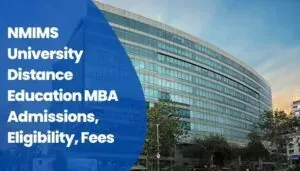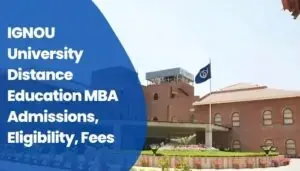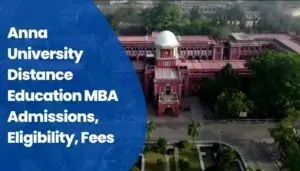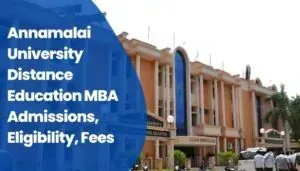Discover the Best Distance MBA Universities in India
MBA distance education in India provides a convenient and economical way for career progression. Admissions for 2025-26 are generally open in July session. Most of the universities have set the last date around June 30, 2025, while many, including NMIMS, have set it till August 7, 2025 and IGNOU till July 15, 2025.
The application fee for a candidate will vary from INR 500 to INR 3,000. The annual fees ranges from Rs. 30,000 and Rs. 1,50,000 or above depending upon the university offerings. General eligibility requires a graduation degree from any recognized university with minimum 45-50% aggregate marks. Some colleges may prefer scores of entrance examination like CAT, MAT, XAT, NMAT, etc.
Top colleges such as Indira Gandhi National Open University (IGNOU), Symbiosis Centre for Distance Learning (SCDL), NMIMS Global Access, Amity University and LPU etc. offers various specialisations in Finance, Marketing, HR, Operations, IT etc.
Enquire Now
Distance Learning MBA
MBA Distance Education puts emphasis on developing fundamentals of business along with specific area of expertise. The curriculum primarily includes generic subjects like Marketing Management, Financial Management, Human Resource Management etc. apart from these core subjects, there are wide range of specializations that the program offers such as Business Analytics, Data Analytics and many more. This allows students to tailor their education to specific career goals. Upon the completion of the program graduates from reputable distance MBA programs can expect an average starting salary between INR 4 LPA to INR 8 LPA or even more, highly depending upon the various factors such as experience level, company size etc.
Distance MBA Course Highlights
| Feature | Details |
| Course Name | MBA Distance Education |
| Course Level | Postgraduate |
| Duration | 2 years to 4 years |
| Eligibility | Bachelor’s degree (any discipline) from a recognized university with a minimum aggregate score 45%-50%. Some universities might require a valid score in entrance exams like CAT, MAT, XAT, NMAT, CMAT, etc. |
| Total Course Fees | INR 50,000 to INR 3,00,000 |
| Mode of Study | Distance Learning |
| Specializations Offered | Finance, Marketing, HRM, Operations Management, International Business etc. |
| Top Colleges | IGNOU, SCDL, NMIMS University, Amity University, Manipal University, LPU etc. |
| Average Salary | INR 3 LPA to INR 15 LPA |
| Career Opportunities | Marketing Manager, Financial Analyst, Human Resource Manager, Operations Manager, Project Manager etc. |
MBA Distance Course Fees
The fee for MBA Distance Education varies between INR 50K to INR 3 lakhs or above. Government universities like IGNOU offer affordable programs while the private or high ranked universities charge high fees due to the brand name, better curriculum, and placement support. Fees can also rise based on the specialization (e.g., Digital Marketing, Data Analytics), course duration and extra features such as live classes, digital materials or career assistance etc. Most Universities often provide flexible payment options which include semester-wise installments and EMIs. The application fee ranges between INR 500 to INR 3000. The fees can be paid through Debit/Credit Card, UPI, Net Banking etc. Potential students compare fee structures and check for scholarships, or financial aid before applying.
MBA Colleges Distance Learning
Distance MBA Education in India is a flexible learning programme which does not require students to attend classes on campus and can be availed by professionals and learners situated even in remote areas. While selecting a college one should consider UGC-DEB approval so that it does not affect the degree credibility. Also priortize the reputation of the university, curriculum, specialisation, faculty expertise, learning methodology, cost, and placement support to ensure it aligns with career goals.
Common eligibility requirement by most of the colleges:
- Bachelor’s Degree: Candidates must hold a bachelor’s degree in any discipline from a recognized university.
- Minimum Aggregate Percentage: A minimum of 40% to 50% aggregate marks in graduation is typically required.
- Relaxation for Reserved Categories: Some relaxation in the minimum percentage is often provided for reserved categories (SC/ST).
- Entrance Exams (Varying Requirement): Many distance MBA programs do not mandate entrance exams while some may prefer scores from national-level management entrance exams (e.g., CAT, MAT, CMAT) .
Application process followed by most of the universities:
- Online Application: Visit the university’s official website and fill out the form.
- Document Upload: Submit scanned copies of academic mark sheets, photo, signature, ID proof, and work experience (if any).
- Application Fee: Pay the non-refundable fee online (typically ₹500–₹2,000).
- Entrance Exam/Interview: Appears only if required by the university.
- Fee Payment: Pay course fees online (installments/EMI options available).
- Enrollment: Receive confirmation with access to LMS, study materials, and orientation details.
Best University for MBA in India - Average Fees
India’s MBA Distance Education program landscape offers a flexible, cost-effective route for working professionals and remote learners to gain a recognized management qualification. Unlike traditional MBAs, these programs prioritize accessibility, practical skills, and career advancement without requiring a career break. UGC-DEB approval ensures degree validity, while institutions differ in fees, digital infrastructure, and student support. The table below highlights key universities, accreditations, and approximate fees—serving as a starting point for comparison. However, applicants should verify all details on official websites to ensure the program aligns with their goals and learning preferences.
| College Name | Accreditation | Average Program Fees |
| Narsee Monjee Institute of Management Studies | UGC-DEB Approved | INR 2,10,000 |
| ICFAI University | UGC-DEB Approved | INR 2,00,000 |
| Amity University | UGC-DEB Approved | INR 1,99,000 |
| Institute of Management Technology | UGC Approved | INR 1,60,000 |
| Welingkar Institute of Management | UGC-DEB Approved | INR 1,26,000 |
| MIT School of Distance Learning | UGC-DEB Approved | INR 95,000 |
| Suresh Gyan Vihar University | UGC-DEB Approved | INR 80,000 |
| Chandigarh University | UGC-DEB Approved | INR 71,360 |
| Symbiosis Centre For Distance Learning | UGC-DEB Approved | INR 65,000 |
| Indira Gandhi National Open University | UGC-DEB Approved | INR 62,000 |
| Lovely Professional University | UGC-DEB Approved | INR 62,000 |
| Jaipur National University | UGC-DEB Approved | INR 50,000 |
| University of Madras | UGC-DEB Approved | INR 44,690 |
| Annamalai University | UGC-DEB Approved | INR 40,000 |
| Pondicherry University | UGC-DEB Approved | INR 40,000 – INR 75,500 |
Government Jobs for MBA
Government jobs for MBA graduates offer stability and public service opportunities. Beyond Civil Services, MBAs are hired by PSUs (e.g., ONGC, NTPC) as Management Trainees in various functions. The public banking sector (SBI, RBI, SEBI) and Indian Railways also recruit MBAs for managerial and specialist roles. These positions are competitive but provide excellent benefits, security, and career progression.
To secure government jobs as an MBA graduate, the primary pathway involves clearing highly competitive national-level entrance exams. While the prestigious UPSC Civil Services Exam is open to all graduates, including MBAs, specialized exams are crucial for specific roles. For instance, aspiring banking professionals must clear tests like RBI Grade B Officer or IBPS PO/SO exams for public sector banks. PSUs like ONGC or NTPC often recruit through GATE scores or their own selection processes for Management Trainee roles.
| Job Role | Average Annual Salary (INR) | Description |
| RBI Grade B Officer | 17 – 20 Lakhs | Manages monetary policy, financial regulations. |
| SEBI Grade A Officer | 10 – 12 Lakhs | Regulates capital markets, ensures compliance. |
| SBI Probationary Officer (PO) | 8 – 10 Lakhs | Manages bank operations, lending, customer service. |
| NABARD Officer (Grade A/B) | 10 – 14 Lakhs | Develops rural infrastructure & agricultural credit. |
| PSU Management Trainee (MT) | 8 – 12 Lakhs | Works in operations, HR, marketing in public enterprises. |
| Indian Railways IRMS Officer | 10 – 12 Lakhs | Oversees railway operations, logistics, projects. |
| UPSC Civil Services (IAS/IES) | 10 – 14 Lakhs | Handles policymaking, administration, economic development. |
| Marketing Officer (Public Sector Banks/PSUs) | 7 – 10 Lakhs | Plans & executes marketing campaigns for government schemes. |
| HR Officer (PSUs/Govt. Depts.) | 6 – 9 Lakhs | Manages recruitment, employee welfare, growth. |
| Finance Officer (RBI/Ministry of Finance) | 8 – 12 Lakhs | Manages financial planning, analysis, and budgets. |
| Logistics/Administrative Officer (Defense Services) | 10 – 13 Lakhs | Manages supply chains, procurement, and admin support. |
Distance MBA Specializations List
Distance MBA Education programs typically begin with foundational business principles, but their true depth comes through specializations. This allows students to concentrate on a particular domain, acquiring in-depth knowledge and targeted skills. Such focused study aligns education with specific career aspirations and industry demands, enabling graduates to develop expertise in a chosen field. This strategic choice empowers individuals with specialized competencies, making them highly attractive candidates for specific roles and accelerating their professional growth within their desired sectors.
The table summarizes various MBA specializations, outlining the career prospects typically associated with each. It serves as a concise guide for prospective students to understand the diverse professional paths opened by different areas of focus within an MBA program.
| Specialization | Career Prospects |
| Finance Management | Finance Analyst, Portfolio Manager, Risk Manager, Investment Banking. |
| Marketing Management | Marketing Manager, Product Manager, Brand Manager, Digital Marketing Specialist. |
| Human Resource Management | HR Manager, Talent Acquisition Specialist, Organizational Development Consultant, Employee Relations. |
| Operations Management | Operations Manager, Supply Chain Manager, Logistics Manager, Production Manager. |
| International Business | International Marketing Manager, Global Supply Chain Specialist, Trade Analyst. |
| Information Technology (IT) Management | IT Manager, Business Analyst, Systems Manager, IT Project Manager. |
| Business Analytics / Data Analytics | Data Analyst, Business Intelligence Analyst, Data Scientist. |
| Logistics & Supply Chain Management | Supply Chain Manager, Logistics Coordinator, Procurement Specialist. |
| Project Management | Project Manager, Program Manager. |
| Healthcare Management | Hospital Administrator, Healthcare Operations Manager. |
| Retail Management | Retail Manager, Merchandising Manager, Store Operations. |
| General Management | General Manager, Entrepreneur, Management Consultant. |
| Banking and Finance Management | Bank Manager, Financial Advisor, Credit Analyst. |
| Fintech Management | Fintech Analyst, Digital Payment Specialist, Blockchain Consultant. |
| Hospitality Management | Hotel Manager, Resort Manager, Tourism Operations. |
| Entrepreneurship | Startup Founder, Business Development Manager. |
Note: Career prospects can vary based on the specific university, individual skills, industry trends, and economic conditions.
Distance MBA vs Regular MBA
A Regular MBA is a full-time, on-campus, immersive program ideal for a career break and deep networking. A Distance MBA offers flexible, remote learning at a lower cost, perfect for working professionals or those with constraints. This table compares Regular and Distance MBAs, highlighting differences in cost, flexibility, learning mode, placements, and suitability for working professionals.
| Feature | Regular MBA | Distance MBA |
|---|---|---|
| Program Delivery | Offline, on-campus classroom study. | Online/remote study with virtual classrooms or self-paced learning. |
| Flexibility of Time | Fixed schedule and timetable; limited flexibility. | High flexibility; allows balancing study with work/personal commitments. |
| Attendance | Required for each class. | Not typically required for classes (often self-paced or recorded). |
| Physical Presence | Required in the classroom daily. | Required only for exams (which are often offline) or specific workshops. |
| Student-Teacher Interaction | Strong connection and extensive networking opportunities due to daily campus interaction. | Limited opportunities for direct student-teacher or peer bonding. |
| Internships | Generally provides structured internship programs. | Typically does not provide internships directly; students arrange their own. |
| Placement Opportunities | Provides dedicated placement opportunities and assistance. | Generally does not provide direct placement opportunities. |
| Course Fee | Generally higher (e.g., around INR 10 Lakhs or more). | Significantly lower, similar to or less than Online MBA courses. |
| Career Break | Often requires taking a career break. | Does not require a career break; ideal for working professionals. |
| Learning Experience | Immersive, hands-on, extensive campus life. | Self-directed, relies heavily on digital resources and self-discipline. |
Pros and Cons of Distance MBA
A Distance Learning MBA offers a unique set of advantages and disadvantages compared to traditional full-time programs, making it a suitable choice for specific cohorts of aspiring management professionals.
Pros of Distance MBA:
- Flexibility and Self-Paced Learning: A major advantage is the flexibility to study at one’s own pace, with weekend or recorded classes that fit around work and personal commitments.
- Cost-Effectiveness: Distance MBA programs are cost-effective, avoiding expenses like relocation, accommodation, and commuting, making management education more accessible.
- Accessibility: These programs are invaluable for individuals facing geographical barriers or living in remote areas, enabling them to access quality management education without the need to physically attend a campus.
- Continuation of Employment: A key benefit for professionals is the ability to work full-time while studying, allowing them to apply learning on the job and continue earning.
- Technology Integration: Modern Distance MBA courses use advanced tech like videos, visuals, and online tools to enhance learning. Content is often self-paced and downloadable.
Cons of Distance MBA:
- Limited Networking Opportunities: Compared to regular MBAs, distance learning offers limited face-to-face interaction, reducing networking, peer learning, and campus engagement opportunities.
- Less Immersive Experience: The absence of daily campus life means a less immersive educational experience. Students might miss out on regular events, club activities, and functional exercises that contribute to holistic development and practical exposure in a traditional setting.
- Self-Discipline and Motivation Required: The flexible nature of distance learning demands a high degree of self-discipline, time management skills, and self-motivation. Students are largely responsible for managing their course schedules and staying on track, which can be challenging for some.
- Perception and Recognition (Varying): While a Distance MBA from an accredited institution is widely accepted, some employers may still prefer a regular MBA for top-tier roles, which can affect career growth in certain cases.
- Limited Hands-on Experience: Distance programs might offer fewer opportunities for hands-on, experiential learning or direct participation in large-scale live projects compared to the more practical-oriented approach often found in full-time campus programs.
- Slower Feedback and Support: Due to the asynchronous nature of communication in some distance learning models, students might experience slower feedback and support compared to the immediate interactions available in a traditional classroom setting.












